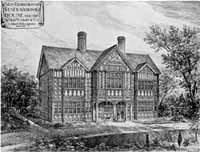 |
Department Electra House |
Whilst other personnel were lodged at twelve or so lesser dwellings in Woburn, or the immediate district, as head of the organisation Campbell Stuart, together with two or three close associates, occupied Paris House, on the Woburn estate. Visually stunning, a late nineteenth

As for those personnel recruited for the British headquarters, which was always referred to as C.H.Q., Country Headquarters, and never as Woburn, including Michael Gibbs-Smith, Campbell Stuart’s administration officer, the Electra House Department duly moved in. Only a few knew the location and so the majority were instructed to make their way to the Sugar Loaf Hotel on the Watling Street, at Dunstable, where Gibbs Smith drew them a sketch map or arranged transport. Both the stable wing and the Riding School found a use as offices whilst flats above the stables served as sleeping quarters although upon mobilisation bedrooms were still being readied and bathrooms installed. The outbreak of the war then saw 24 small cubicles partitioned off along the 150 yards length of the Riding School with a corridor running along the centre. If the accommodation seemed basic, the premises nevertheless gained an air of grandeur through the presence of several important works of art, since the Riding School had enjoyed a former use as an overflow gallery.
As sixty personnel prepared to go about their duties, the Duke of Bedford paid an early visit to witness this unaccustomed activity. Catered for initially by J. Lyons and Co., almost 10% of the departmental salary bill regularly went through the till of the canteen bar! Later, A.B.C. took over the contract.